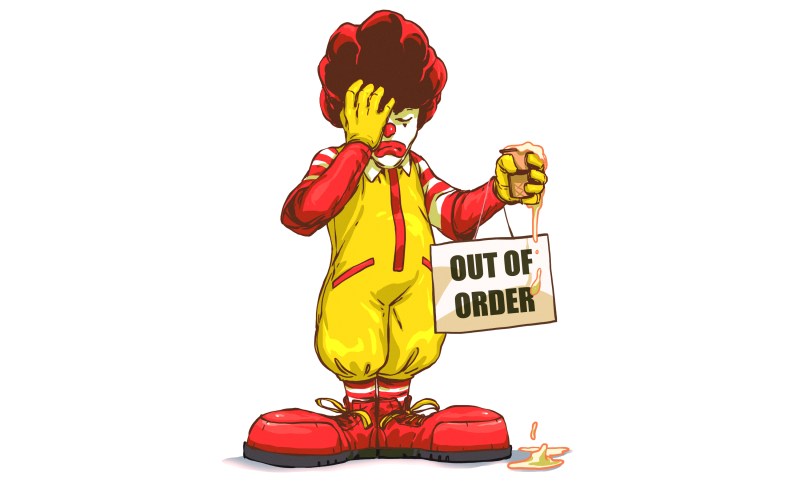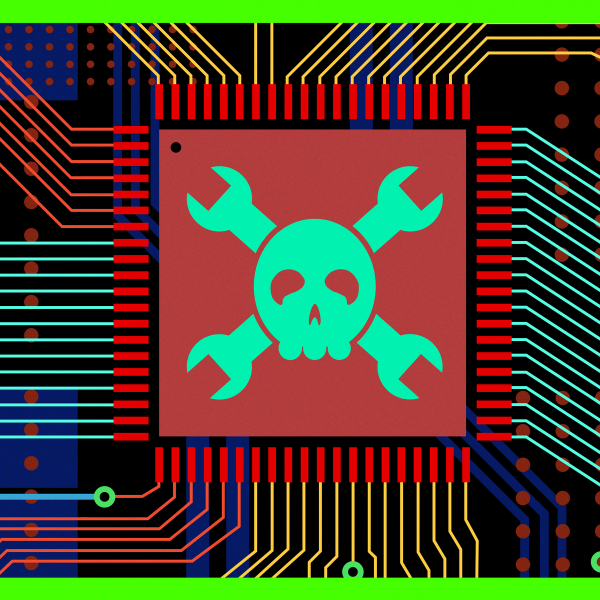An unlikely theatre for an act in the right-to-repair saga came last year in the form of McDonalds restaurants, whose McFlurry ice cream machines are prone to breakdown. The manufacturer had locked them down, and a franchisee with a broken machine had no option but to call them for an expensive repair job. iFixit and Public Knowledge challenged this with a request for a DMCA exemption from the Copyright Office, and now news emerges that this has been granted.
The exemption in question isn’t specific to McDonalds, instead it applies to retail food preparation equipment in general, which includes ice-cream machines. We’re guessing that franchisees won’t be breaking out the screwdrivers either, instead it’s likely to lower significantly the cost of a service contract for them and any other food industry operators hit with the same problem. Meanwhile any hackers who’ve picked up an old machine can now fix it themselves without breaking the law, and maybe the chances of your local Mickey D’s having no McFlurries have gone down.
This story has featured more than once on these pages, so catch up here, and here.

















Now Donald can do the maintenance. He would ace the repairs and get very good ratings ! (Beautiiful)
One of those machines improperly maintained is a food-borne illness nightmare. I don’t think I want the average macdonald’s employee maintaining them
I don’t think the employees will repair them. It’s just possible to hire someone else other than the manufacturer to do it. Employees always did the maintenance in terms of cleaning and sterilization.
So’s the whole restaurant. If you’re concerned about food-borne illness that much dont eat out anywhere. Actually don’t eat in with any food you’ve purchased either. We do pretty good compared to days of yore of course but no piece of the system is perfect from crops to shops, to manufacturing, and end use.
No it isn’t, not at all comparable. You can leave one of those burgers out at room temperature for a month and it won’t spoil, it’s almost creepy. The little channels and crevices inside the ice cream machine are a perfect petri dish if it isn’t at the right temperature and properly maintained
He’ll you can leave lit for 5 years one woman did fries and cheeseburger and both neither rot spoiled or even grew mold that’s just disturbing when even pests won’t touch it.
I see these unspoilt wonder-burgers now and then. Just a question; has anybody seen anyone eat one? Ate one themselves? One that was left out for months or years? Did they/you suffer any side-effects?
Tell us!
Those little channels need to be cleaned every day. I am sure the emplyees do it now. If not we woulld have lots of complaints about illness. I do not what you are talking about.
It’s the high salt and low moisture content… Nothing magical
I’ve heard horror stories about them. Also heard pizza hut ovens are nasty from repairmen but at least that is hot enough to kill bacteria.
Same reason almost all vending machines have black shelves or no window: It’s so you can’t see the black mould forming from constant condensation.
Some operators clean weekly. Others clean yearly. Some never do.
I know because I used to repair them as a job. You’d learn which operators are clean. Cleanliness had no relation to the size of the operator.
Typical scaremongering…
No, he is right, only proper board-certified repair-persons should perform repairs on food equipment, or participate in the supply chain for restaurants and retail markets. It is the reason we do not have repeated listeria and e Coli outbreaks plaguing our nation’s food service industries today. Remember kids, enforcement of certification and licensing requirements is what has made our world what it is.
Bullshit. These machines must be maintained by regular staff when they’re functioning normally. How does fixing them suddenly require outside experts to perform normal maintenance?
That is absolutely a complete joke and you must a super special super important board certified repair wizard the way you talk like that certification means anything when it doesn’t. The employees do the regular cleaning not repair techs and repair techs. No repair techs are out there doing God work protecting us all like batman. Get over yourselves certified techs…you aren’t special at all
Boo!
???? This ruling means McDonald’s franchisees can hire third party repair companies though. Instead of having the machine down for weeks waiting on the manufacturer. The dishwasher doesn’t have the time to fix the ice cream machine.
Same reason labs don’t have chemists fix the mass spec, they just call agilent. Get off your high horse
When I worked in a medical lab as chemist I repaired and maintained instruments routinely. SOP. If the equipment passes calibration and QA it’s working. That being there’s likely 5 orders of magnitude more complexity in mass spec than an ice cream machine. SMH
That’s BS. The machine manufacturer just wants to milk the customer for repairs. John Deere was doing the same thing with tractors. Good borne illness is not from repairs,it is from cleaning. I guess if the machine doesn’t work it reduces the chance for illness but that logic is specious.
As someone who is Talyor certified and an in house technician I can tell you all there are not many design flaws to these. 98 percent of these issues come from employee self inflicted issues. They are delicate machines that require proper amounts of mix in them in order to go through a proper heat cycle every night for pasteurization purposes. There is another brand that McDonalds can use as well. This is not the only machine they have to resort to. All in all good machines, poor handling once in the hands of most stores. Almost everything on these machines can be serviced or repaired if someone has the knowledge and experience to do so.
If the machine can’t handle day-to-day usage, then by definition it is a crappy machine. If the machine fails when it gets “in the hands of most stores” then the machine needs a serious redesign from the ground up.
Yeah perfect machine but 99% of users just don’t get it.
Maybe McDonald’s should hire certified techs only to handle the machines to ensure they function properly?
Who do you think maintains them now?
You don’t know anything
They aren’t, and won’t. This is about being able to pay local professionals for repairs where the DMCA is weaponized against the purchaser of equipment.
It’s a ,”CIP”, system CLEAN IN PLACE automated system to sanitize internal elements of the machines close door press button & wait
As opposed to all the other equipment in there? Okay Karen.
You think McDonalds has a third party specialist come in every night and maintain the machines? This is about repairs, not maintenance.
But there’s no issue with employees maintaining proper hygiene and cleanliness standards for all of the other food preparation, handling and storage areas within the restaurant?
Most of the time they aren’t broken. The employees are too lazy to clean and/or restock
You say lazy they say efficient. They get paid the same either way. Why bother if they can get away with it.
Sorry, no.
The machines have severe design flaws that cause them to essentially soft-lock themselves with no other fix than to place a service call, this is widely documented. What’s more these restaurants have to use this specific flawed model due to contract stipulations on Franchisees.
Yep, here is a reference: https://youtu.be/SrDEtSlqJC4?si=z3-n8VIUxPCNSIWi
Suuuure. The hundreds of articles online detailing their issues would like to argue otherwise.
Tell me you’ve never held a fast food job for longer than a week without telling me you’ve never held a fast food job for longer than a week:
This is amazing, a win for the right to repair!
Not really. This is just a huge corporation essentially buying their way out of a law so they can pay less in the future. A win for right to repair would be the repeal of this DMCA garbage.
Agreed. Arguably, carving out corporate exemptions actually weakens the R2R movement. Corporations don’t need to put their legal weight behind the movement if they know they can just buy whatever exemptions they specifically need.
This carveout has nothing to do with McDonald’s directly – they did not take part in the petition that led to the ruling, nor is the ruling limited to either Taylor machines or to McDonald’s. The petition was made by Public Knowledge and iFixit.
In addition, McDonald’s are in the process of being sued by third-party Kytch for colluding with Taylor to block third-party repairs, and are reportedly now working on a settlement per Ars Technica.
Sure, allow the machine to go into a fail state because it hasn’t been cleaned. However, the machine should report that that is the case and resume proper operation after cleaning… Not require “maintenance”!
The McFlurry machines are not the same as the Taylor C602 softserve machine which are notorious for breakdowns.
The McFlurry machine is just a regular commercial blender with the mixing shaft replaced with a connector that lets them attach that weird plastic spoon with the hollow square handle and thereby requires less cleaning.
Having worked at McD’s and several other fast food chains, I feel 100% confident to tell everyone that the machines are rarely ever broken or inoperable. The issue is actually OSHA and an employee’s age, The ice cream, milk shake, and even soda machines, require the operator to be 18 years old. Most fast food restaurants hire people under 18 to work the front counter and drive through. They cant even refill the machines without violations to OSHA and some state laws. I’ll guarantee 99% of the time you are told its not working is to prevent customers from coercing teens from operating machinery. You’ve all been lied to… They are actually simple machines internally.
Nope. When I was 17, I worked at a major Florida theme park with Taylor soft serve machines. I not only operated them, I also cleaned, lubricated, and assembled them in the morning, then disassembled and cleaned them in the evening. My employer was under constant scrutiny from OSHA (and the union), and this was fine by them.
im more disapointed that it takes a mega-franchise to get an exception to a stupid law. your typical mom and pop convenience store owner could never get something like this done. so +1 for crony capitalism, -1 for free markets.
seems it would be cheaper to come up with a proprietary machine ownd by mcdonalds than to pay for all this lobbying.
Except it didnt take a mega franchise. RIF
iFixit and Public Knowledge challenged this with a request for a DMCA exemption from the Copyright Office NOT McDs. The Office granted an exemption specifically allowing people to circumvent digital locks in order to repair retail-level food preparation equipment – including soft serve ice cream machines similar to those available at McDonald’s.
Sadly, I don’t believe this will change anything for the mcFlury machines
This is a play by McDonalds against (or more correctly a way to extract more money out of) the franchise holders
McDonalds has been working hand in hand with Taylor for years, and the franchises are paying the price
It’s likely that McDonalds is the agent forcing the owners to use Taylor’s machines and signed the maintenance contract locking the price (and sharing profit with Taylor)
Ding ding we have a winner! thank you for saying whats really going on.
When you use that phrase it’s like wearing a hat that says “I am le epic redditor, the narwhal bacons at midnight!” and going into public
no idea what that’s about but I’ve never used reddit so excuse my ignorance
McDonald’s had nothing to do with the petition, and are in fact already being sued (by Kytch) for colluding with Taylor to block third-part repairs. This ruling actually weakens McDonald’s position.
Are the machines on lease from the manufacturer? No? Then they have no right to stipulate how they’re repaired or who can repair them.
It kind of depends on if the transaction was a Regular Sale under the U.C.C. By default yes, I think you exchange money for goods and you own the thing. And that’s the end of story.
If you sign an agreement in order to do the transaction. And there are sufficient Considerations as part of the agreement. Then theoretically you can have an object that you paid one time for that you do not have the right to do with as you please.
Ultimately a court has to decide if the agreement is even binding. For example, if there is no time limit on the restrictions then the agreement is on pretty shaky ground. In some jurisdictions these agreements aren’t binding at all now. Things get real complicated when a company starts having lawyers write weird contracts.
(IANAL – I’m just someone on the receiving end of some Non-recurring engineering agreements over the years. Some of them with pretty specific clauses)
According to court filings, McDonald’s and Taylor is accused of entering an exclusive agreement to require franchisees to buy (not lease) Taylor’s soft-serve ice cream machines and effectively force the franchisee into using Taylor for all service of the machines. The McDonald’s franchise agreement stipulated that a franchisee must purchase a specific model of Taylor’s soft-serve ice cream equipment.
On that model, if any parameter falls outside allowed ranges the machine would enter “maintenance required mode” and refuse to do anything unless serviced by a Taylor service technician. That includes simple things such as underfilling or overfilling the mix. Naturally the machine only provided opaque and undocumented error codes that could be interpreted only by a Taylor service technician. Franchisees would be forced to call and pay for a technician from Taylor to get their machine back into service.
Other Taylor models provided much more extensive error messages and documentation to allow an owner to service the machine themselves, but McDonald’s franchisees were not allowed to purchase those models.
Thank goodness the courts can protect a $200B company from a $1B company. Imagine how difficult it might be for a company worth only $200B to purchase equipment from another vendor or to develop their own equipment.
This isn’t McDonald’s vs. Taylor, it’s McDonald’s franchisees vs. Taylor & McDonalds. McDonald’s corporate is alleged to be colluding with Taylor to force franchisees to purchase Taylor equipment the franchisees can’t repair themselves.
Is ‘DMCA’ a globally recognized acronym that doesn’t even require explaining what it means?
I have no idea what it means, by the way.
DMCA = Digital Millenium Copyright Act. It’s an America law which, among other things, makes it illegal to circumvent copy and access protect mechanisms used to protect copyrightable software. It was so poorly written that it allows unscrupulous corporations like Taylor and John Deere to weaponize it in order to prevent access to repair non-copyrightable mechanical systems.
And it may well be the most anti-consumer law ever foisted upon us. :(
Obviously, almost everyone commenting has no idea what they’re talking about. This is about the propietery “warning system” these machines have that will shut down a machine without the “service vendor” who charges an arm and a leg eventually gets to the store. Another company has a replacement part/system that monitors the same things, but doesn’t shut down the machine when for example, it gets a low level (of shake mix).
I hope Cracker Barrel is reading this article.